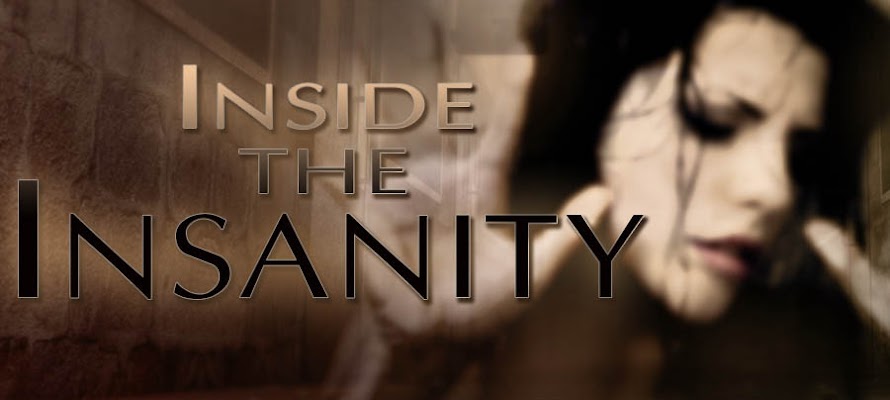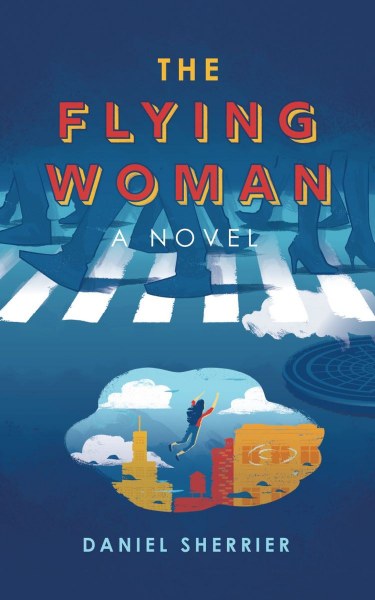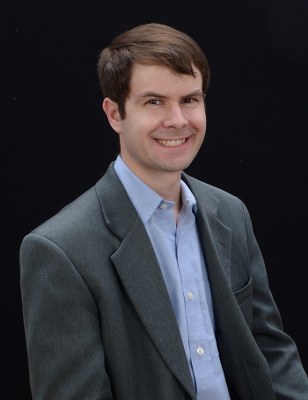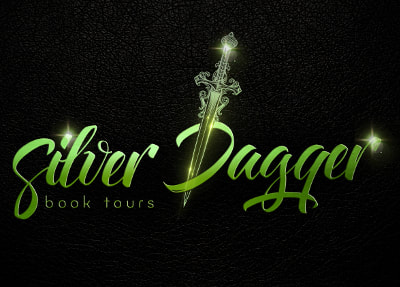The Flying Woman
Terrific Book 1
by Daniel Sherrier
Genre: Superhero Fantasy
The impossible has become reality! A masked man possesses extraordinary powers, and he’s using
those fantastic abilities to fight crime and pursue justice. Meanwhile, Miranda Thomas expects to fail at
the only thing she ever wanted to do: become a famous star of the stage and screen. One night, Miranda
encounters a woman who’s more than human. But this powerful woman is dying, fatally wounded by an
unknown assailant. Miranda’s next decision propels her life in a new direction—and nothing can prepare
her for how she, and the world, will change.
Amazon
* B&N * Books-A-Million * IndieBound
Daniel Sherrier is a writer based in central Virginia. He is the author of the novel "The Flying Woman." A
College of William & Mary graduate, he has worked for community newspapers, written a few plays
that have been performed, and earned his black belt in Thai kickboxing. And there was that one time he
jumped out of an airplane, which was memorable.
GUEST POST
Interview with Daniel Sherrier
What inspired you to
write this book?
I’ve read superhero
comics since I was nine years old, and I’ve always wanted to make
my own contribution to the genre.
My first serious
attempt at a superhero story was actually a play I wrote in college,
called Super!, which was eventually performed in a small
Chicago theater in 2008. That story focused on the secret identities
behind the cartoonish superhero facades, and it was partially
inspired by watching old Superfriends cartoons full of
stalwart superheroes tackling ridiculous threats, without any
personal problems. What if this surface-level perfection was just
their professional demeanor, but they were struggling with personal
issues in the backs of their minds?
I’ve always felt I
could do more with the characters from that play. I attempted a
television pilot script at one point, but novels ultimately wound up
being the way forward. The execution needed to be very different,
though. The stark contrast between cartoonish superheroes and their
more realistic, down-to-earth, flawed secret identities worked well
on the stage—it was indeed very theatrical. But in prose, I needed
to fill in the space between those extremes to make it work.
What can we expect
from you in the future?
I’m currently working
on the sequel to The Flying Woman. Admittedly, I’m a bit
behind. I got pretty far along with what I thought was the
second book, then realized I was actually writing the third (or maybe
even the fourth). So I had to start over, but now I’m making good
progress on something that should work very well as book two.
On the bright side,
I’ll have a great head start when I do eventually get to that later
book.
Can you tell us a
little bit about the characters in The Flying Woman?
The main character,
Miranda Thomas, is a 22-year-old aspiring actress. Acting is all
she’s ever wanted to do. It’s the main thing she’s studied and
trained for, and nothing less than phenomenal success will suffice,
even as she realizes what a longshot that is.
But then, after an
encounter with a dying super-woman, she develops super-powers, and
she has to navigate new possibilities—and, more importantly, new
responsibilities that she never expected.
With Miranda, I tried
to make the most human superhero possible, someone who is generally a
good person and has a solid moral compass, but someone who also has
plenty of doubts about her ability to live up to these new
expectations of her. How do you become a perfect superhero when you
know you’re human?
What did you enjoy
most about writing this book?
Is there anything about
writing superheroes that’s not enjoyable?
Who designed your
book covers?
Justin Burks of
Birdhouse Branding, and he did a fantastic job. I’ve gotten quite a
few compliments about the cover at book festivals, but I can take
credit only for approving it.
Did you learn
anything during the writing of your recent book?
This is my first full
novel I’ve published (I had previously focused on novellas), so
this was quite an educational experience. I rewrote this book nearly
from scratch three and a half times before landing on something that
worked.
The first version was
basically a comic book series in prose, so that wasn’t the right
approach for a novel. The second was more like a movie in prose,
which was closer to the mark but still not quite right. Finally,
working with my editor, Matthew Limpede, I managed to develop a novel
that was actually a novel. And then people read it and said, “I
enjoyed it! It’s like a comic book in prose!”
Still, though, those
earlier versions would have been entertaining but forgettable. There
are reasons why superhero stories work great in comics, movies, and
television, but I needed to figure out how they could work in prose.
I had to reintroduce the genre, to some degree, sort of like how the
first Iron Man movie reintroduced the genre to set the stage for the
Marvel Cinematic Universe.
In a sense, I had to
explore the spaces between the comic book panels, in addition to the
panels themselves. It was a lot of extra work, but the final product
is vastly improved because of it, if I do say so myself.
If your book was
made into a film, who would you like to play the lead?
I would want to follow
the tradition of Superman: The Movie and cast a relatively
unknown actress. No doubt there’s some talented actress no one has
ever heard of who would be the perfect Miranda.
How did you come up
with name of this book?
I was originally
calling it Terrific, which wound up being the series name. I
love that one definition of the word is “wonderful,” and another
is “terrifying,” which captures the extraordinary responsibility
of a superhero quite well—any extraordinary responsibility, for
that matter. But it does work better for the series as a whole rather
than just the first book.
The term “the flying
woman” arose organically in the manuscript as a general reference
to Miranda as she’s just starting out as a superhero. I knew I
didn’t want to use her actual superhero name, Ultra Woman, as the
title, but my editor suggested The Flying Woman, and I agreed
that it sounded like the right approach.
What did you
edit out of this book?
I had a really boring,
drawn-out scene of Miranda planning and assembling her original
superhero costume, but it brought the momentum to a halt. So, I
compressed that part to the minimum and wove it in with other plot
elements.
How long have you
been writing?
When I was nine, I
started writing and drawing my own comic books with my own
superheroes. I eventually gave up on drawing—didn’t have the
patience for it—but I never figured out how to stop writing, which
I somehow do have the patience for. I guess I just have selective
patience.
Do you prefer to
write in silence or with noise? Why?
Music is essential to
writing. I usually listen to instrumental movie and TV soundtracks as
a sort of creative lubricant. I’ve put all my soundtracks into a
single playlist in my iTunes player, and I just let it play at random
while I work. This way, I’m not immersed in the atmosphere of any
single movie or television series, but I’m listening to a mix of
styles, tones, and genres from different composers, which I
personally find more effective.
Pen or type writer
or computer?
Computer primarily, but
I will sometimes brainstorm with pen and paper. I am just barely old
enough to have learned to type on a typewriter, but I don’t see any
benefit to using one at this point. I’d be too self-conscious about
wasting ink and paper, and whiteout is not the most efficient means
of correcting typos.
Advice they would
give new authors?
Exercise is essential.
It’s essential for everyone, of course, but writing is one of those
occupations where it can be a little too easy to neglect physical
activity. Remember, exercise boosts not only the body but also the
mind. Exercising has a very high chance of improving your writing.
Everyone’s at a
different level of physical fitness, but virtually everyone can do
something that will benefit them—and they can do it today. If
you’ve been sedentary for a while, go for a walk. If you routinely
run five miles a day, try running 5.1 miles. If you’ve been at your
desk for a couple of hours, get up and do some jumping jacks, or drop
to the floor and do crunches and push-ups.
It’s easy to find
excuses not to exercise, but it’s also not that hard to find ways
to sneak some physical activity into your day. Writing is not an
excuse to avoid exercise. Rather, exercise is essential to writing at
your best level.
What are they
currently reading?
I’m a bit behind, but
I’m currently reading the first Games of Thrones book. I
started it several years ago and read a little over a hundred pages,
but it wasn’t grabbing me. So, I left the bookmark in, put it back
on my shelf, and moved on to other books.
On a whim, I decided to
give it another chance. I just picked up where I left off, and now I
find myself appreciating how well done it is. I doubt I’ll wind up
being a hardcore GoT fan, but I’m beginning to see what so
many others have seen in it all this time.
This is why I don’t
like to bash books that aren’t working for me. In some cases, it
might actually be just a bad book, but it could also be that it
simply didn’t work for me at that point in time. I could have been
in the wrong mood or the wrong frame of mind, or perhaps its flaws
just bugged me more than others. No book is perfect. No book is
beyond criticism. At the same time, a book that’s deeply flawed may
still resonate with some people.
We’re not smarter
just because we hate what everyone else loves or love what everyone
else hates. There are certainly well-established principles of
storytelling that are worth paying attention to. Ultimately, though,
reading is a subjective experience.
I started reading Games
of Thrones and didn’t like it. I resumed reading Game of
Thrones and am enjoying it. Which me is correct?
$25 Amazon gift card
Follow the tour HERE for special content and a giveaway!







No comments:
Post a Comment